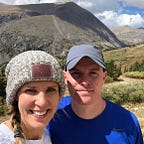Finders, Minders, or Grinders
Who do you want to be in a professional service organization?
During the start of my career a veteran of the consulting world told me about this pyramid and how he perceived the hierarchy of any organization providing professional services (legal, engineering, consulting, accounting, technology, or others) o other organizations.
He drew this on the white board and at the bottom of of it he wrote the word “Grinders”.
He told me that I was a grinder and I was proud of it in that moment. Thinking it was a compliment as I was a hard worker and handled very challenging things well. I had also been exceeding all the goals and objectives that got outlined for me.
At the time I was trying to decide on moving from a technical sales role to one that was even more technical and billable. There were a ton of smart people working in those roles that were MBAs and graduates from fancy schools. I was fresh out of college, didn’t focus a lot on school, and wanted to show people that I could not only help sell the work. I could do it.
He then quickly popped my ego bubble and told me that these grinders do all the work and make less money than the “Minders” as he drew two lines to create a middle tier in the pyramid.
He said, “the minders maintain a healthy relationship between the client and our teams or grinders.” They work to make sure nothing goes wrong and they nurture the relationship with the client during the peak and backend of the revenue bell curve. Until a larger opportunity to create a new bell curve or stream of value for the client appears or the relationship (tail of revenue) ends.
He then told me that these minders typically work less and don’t spend their days turning wrenches on hundreds of tasks like the grinders.
Monitoring other people sounded boring, but better than turning wrenches in the bottom of some pyramid somewhere based on tasks that are given to you and managed by other people you barely know. I was unsure of what he was pitching me or trying to tell me now.
He then wrote at the top of the pyramid the word…Finders.
He said, the finders are the ones responsible for booking business for the organization. Without new clients, projects, and programs the grinders have nothing to do and the minders have nothing to mind.
The whole business depends on this very small percentage of people in the organization who are able to do this. Furthermore, an even smaller percentage of those people are better at it than everyone else. These people or rain makers often make more money than everyone else, they end up in leadership positions faster, and/or enjoy a lot of freedom and influence.
Sign me up! He was a great sales person and I was sold.
I made the decision to spend the first couple years of my career doing a lot of the grunt work for him and the finders, working on the front line, in the trenches to develop and win new business by supporting, building, and in some cases doing their presentations. I did a lot of the work these people didn’t want to do. In exchange, I got to watch them closely.
I didn’t like all the grunt work, so I studied sales like it was a martial art. I wanted the freedom and influence that came with being successful at it.
I have some personality traits that make a sales role easier for me than other people. You can see how I measure sales people in interviews here. There is an aspect of that in play within every career path, which you have to accept. However, I would say that the primary reasons that I consistently exceed my goals are all learned and not based on natural talent.
He was 100% correct on the compensation front. By getting into a Finder role early in my career, I was able to make multiples more income then I would have following the traditional Sr. Consultant → Manager, Sr. Manager, Director, Vice President, Sr VP or Practice Leader.
Beyond making more money than many surgeons and way more money than the grinders and minders… I got promoted to a VP level faster than anyone else more than once. My ability to sell also allowed me to cut ties with my W-2, start companies, and work independently on my terms for three years.
Without this lesson, I’m not sure where I would be.
After 15+ years of continued learning and practice. I want to give it back. The things that I learned are not taught in school. Complex sales approaches and patterns are consistently evolving, books are stale almost after they are written. The competition is fierce and the stakes are high.
A good example of this… my belief that the best of the best that book business invert that pyramid in their minds.
The best finders feel like it is is their duty to feed the organization with good, challenging work for the grinders. They highlight and celebrate the talent there not because they are altruistic or humble. Because they are smart and know what and who they sell.
The best minders work seamlessly with the finders acknowledging their different skill sets. They provide front line coaching for the minders supporting, nurturing, and growing those grinders. Often the best Finders are identified in that group.
Finders improve by developing and working with people that will either match or exceed their abilities.
This is the way.
